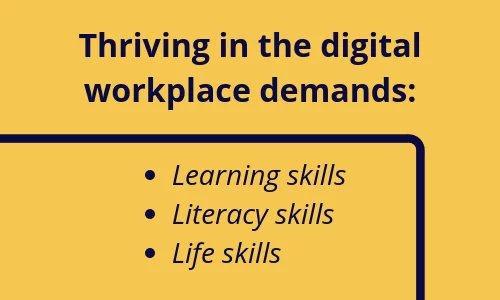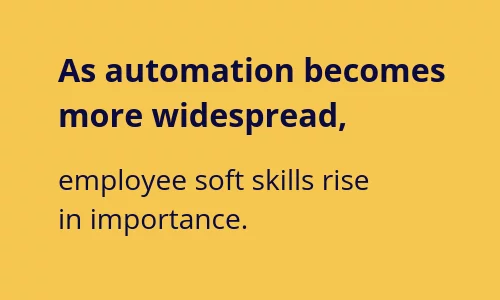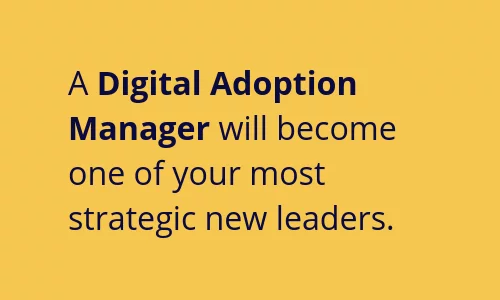In today’s business landscape, is it your job — or is it your work?
Evolving terminology, check. Taking a broader approach to acquiring talent. Hiring more freelancers to supplement full-time workforces. Check, check.
As we dive deeper into the era of disruption, the world of human resources is undergoing a shift of epic proportions.
For example, talent acquisition, one of the core responsibilities of your HR department, is increasingly being ruled by new strategies. Where factors like prior experience and university degrees used to dominate, more progressive HR leaders are beginning to give skills and attitude more weight. Where hiring used to mean filling vacancies, today, smart companies snatch up top talent and make up a new role if they have to.
With HR trends constantly in flux, we asked training professionals around the world to find out what they see as the most important trends to stay on top of in 2019 — and they answered back with stand-out insights.
Dive Deeper: 5 Critical Skill Sets for Employees in the Digital Workplace
Here are the top five digital HR trends to ace in 2019:
1. Crack skills learning for the 21st century
There are three skills employees need to thrive in a tech-saturated world, according to Applied Educational Systems: 
- Learning skills
- Literacy skills
- Life skills
To Soqqle founder Daniel Shen, these are the “three pillars of 21st-century skills.”
How do you enforce these pillars? You “drive the need for employees to accept that learning is a life-long experience and not a one-off activity,” says Shen.
With learning skills, your employees can adapt to the digital workplace’s evolving needs. Show your team how this helps to achieve your company’s strategic goals.
Shen explains that when you encourage “self-directed learning,” and allow employees to choose their own goals, you’ll reinforce learning under the corporate vision. Then, managers and employees can reflect “on opportunities/wins.”
2. It’s the dawn of remote workers
Remote work is gaining momentum.
The Global Leadership Summit in London polled business leaders: 34% said over 50% of their company’s full-time workforce would work remotely by 2020.
What’s more, a quarter of them predicted more than 75% of the team would no longer work in a traditional office — and this is in just about a year’s time.
Strong communication is a must-have for remote teams
Nate Masterson, HR Manager at Maple Holistics, recognizes technology can blur the lines between work and home — and it’s increasingly important to make remote workers “feel supported.”
When employees are working remotely, it’s easy for them to feel isolated.
Especially in the digital age, it’s important for HR leaders to establish what makes “a team truly feel like a team, even if they are not in the same physical space.”
Becky Throckmorton, HR Coordinator at Hanapin Marketing, Benefits and Policy Administration says the secret to growth and retention comes down to a new priority: A balancing act between “work and the personal.”
Odds are, your remote workers will:
- Work more hours.
- Sit and spend the day confined to their desks.
- Experience less human interactions throughout the workday.
This is why Throckmorton believes one way to protect them against burnout is strong communication: “Regular touchpoints with supervisors… [including] video conferences, a communication platform, bringing them in the office for a week, etc.”
3. In an automated world, soft skills take center stage
Robotic process automation could take over up to 800 million global workers’ jobs by 2030, according to findings from McKinsey survey  “Jobs Lost, Jobs Gained: Workforce Transitions in a Time of Automation,”.
“Jobs Lost, Jobs Gained: Workforce Transitions in a Time of Automation,”.
Looking ahead, QLC Chief Happiness Officer Isan de Jesus sees a future of work dominated by machine learning and artificial intelligence. De Jesus highlights soft skills as an essential advantage for knowledge workers.
In the business universe, “collaboration, design thinking, strategy, creativity, adaptability, networking” are poised to be “more important than ever before.”
Alex Robinson, HR Manager of Team Building Hero, says his “priority” for 2019 is to help his team “develop and build their skills as people.”
“We want to invest in helping our employees develop their emotional intelligence, conflict resolution abilities, public speaking and more,” he says. “Though these are generally considered people skills, we’ve found they are critical for success in a digital workforce. For example: keeping healthy relationships between team members that only meet over video calls is very important, and you can do this by improving communication skills.”
4. Today’s employees need improved on-the-job training
When workplace technology gets more intelligent, so must your training solution for employees.
Katy Caselli, Organizational Psychologist, Author, HR Expert and Workforce Development Expert of Building Giants says, true, organizations are updating initiatives to become more digital.
However, Caselli says too many businesses fail to prioritize a “structured training program to effectively teach the use of tools.”
Digital initiatives are only as effective as the training that empowers your team — you need to be able to put those innovative strategies into action.
What ends up happening? “Instead, employees struggle with the changes, offering resistance and negativity while projects drag past deadlines. Without effective training, employees learn by mistakes, injuries and lost customers,” says Caselli.
To advance your training methods with a rapidly evolving tech-verse, equip employees with contextual learning solutions. These tools use algorithms: It’s smart technology, predictive of user needs, and guiding employees on-screen, at a moment’s notice.
5. Have you hired a Digital Adoption Manager?
When it comes to utilizing software, it’s necessary to bring “the human factor” back into your company. But do you have a technology  “lieutenant” protecting the quality of your data?
“lieutenant” protecting the quality of your data?
Beth Zoller, Legal Editor at XpertHR, says that on one hand, data analytics has become a critical tool for HR professionals.
You can use data to analyze any stage of your relationship with employees: “recruiting and hiring, performance and retention as well as employee exit.”
However, the threat of a cyber attack puts your data integrity at risk.
“In the event of a breach, an employer must take stock of what information has been compromised, who is at fault, and how to effectively remediate so that it will not occur again,” adds Zoller.
This should be at the top of your resolutions for 2019: We predict that employers will need to hire a Digital Adoption Manager in the coming year to make sure technology is implemented successfully, used to its fullest extent, and all company data is protected. You need a leader who’s digitally proficient — but also understands people and their unique pain points.
While each of your departments currently fends for themselves, a Digital Adoption Manager can fortify your data integrity efforts and ease the stress of adopting new tools. Help your employees keep pace with new digital processes — and anticipate harm to your data before it infects your business.
Racing ahead in 2019
As an HR training professional, your role in the future of work is complex: You must learn to humanize the digital experience for people.
What’s more, when digital trends are as rapidly changing as the enterprise tools we use, you’re also responsible for keeping pace.
Staying ahead of emerging digital HR trends is pivotal to the success of your organization.
Imagine this: You’re not only in a position to lead HR trends in 2019 — but you can then engage your workforce to leverage competitive skills. Not only will you ensure employee empowerment in the workplace; you’ll fuel valuable business growth and innovation.
Ready to ace big digital HR trends in 2019? Check.
________
WalkMe’s Digital Adoption Platform (DAP) transforms the user experience in today’s overwhelming digital world. Using artificial intelligence, engagement, guidance, and automation, WalkMe’s transparent overlay assists users to complete tasks easily within any enterprise software, mobile application or website. Discover how a DAP can revolutionize your business — request a demo today.

